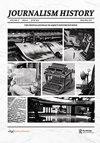When Propaganda Became a Dirty Word
Q4 Social Sciences
引用次数: 0
Abstract
ABSTRACT With the emergence of systematic, pervasive government information programs and the rise of persuasion as a new profession, the words propaganda and publicity became definitional in the twentieth century. This historical qualitative and quantitative content analysis of the New York Times provides a basis for understanding the usage of propaganda and publicity during the years leading up to, during, and after World War I. At the turn of the nineteenth century, propaganda had a benign, narrow meaning. Propaganda became a negative word during World War I. Publicity also did not come out of the war unscathed. This research provides a more granular understanding of the emergence of persuasion as a profession and helps the readers understand the forces behind the emergence of mass communication as a field of study.当宣传变成一句脏话
摘要随着系统化、普遍化的政府信息项目的出现,以及说服作为一种新职业的兴起,宣传和宣传这个词在20世纪成为了一个定义。《纽约时报》的这一历史定性和定量内容分析为理解第一次世界大战前、期间和之后几年宣传和宣传的使用提供了基础。在19世纪之交,宣传具有良性的狭义含义。在第一次世界大战期间,宣传成了一个负面词。宣传也并非从战争中毫发无损。这项研究对说服作为一种职业的出现提供了更细致的理解,并帮助读者理解大众传播作为一个研究领域出现背后的力量。
本文章由计算机程序翻译,如有差异,请以英文原文为准。
求助全文
约1分钟内获得全文
求助全文

 求助内容:
求助内容: 应助结果提醒方式:
应助结果提醒方式:


